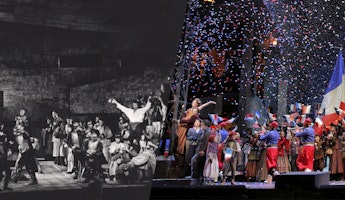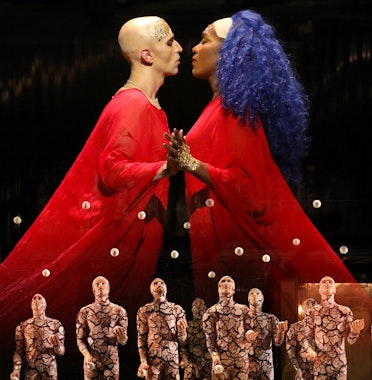Blog
March 11, 2024
A Note from "La Traviata" Director Shawna Lucey
Verdi’s heroine is based on an actual person who is known by many names—Alphonsine, Marguerite, Marie and, in our opera, Violetta. She was the object of obsession and fascination to an entire society in 19th-century Paris. The most famous escort of the age, she inspired works of literature, lithography and opera.
She began life in rural France, the child of a father so violent he almost beat her mother to death. When she was still a child, her father sold her to a deviant old man in their village. According to lore, he either sold her to a group of travelers or merely dropped her off in Paris when she was around age 11 or 12. From that point, she not only taught herself to read and write but worked her way up the informal ladder from grisette to full-blown sex worker.
Our real-life Violetta went on to host the most sophisticated salons, which teemed with the greatest intellectuals in Paris. Not only was composer and pianist Franz Liszt among her lovers, her bedmates included the author and playwright Alexandre Dumas fils, and his father, the successful novelist behind The Three Musketeers. Her fame continues to reverberate well beyond her short life of 23 years.
Violetta is a woman who never knew a relationship that wasn’t transactional until her love for Alfredo. Nor did she know a moment of privacy—not even in death. The debt collectors gambled outside her bedroom, waiting for her to die in order to sell her remaining possessions.
When La Traviata was first produced in 1853, Verdi’s intentions were that it be set in the time of the real woman, Marie Duplessis. The censors balked at the salacious topic and forced it to be set in the mid-1600s. Not until the 1880s were the composer’s wishes respected and the clothing changed to reflect the contemporaneous setting.
Our new design delves into Violetta’s life on display, with her only respite being the country house of Act II. Here we glimpse her healing through love for mere moments before the demands of this society crash through her Garden of Eden in the form of Alfredo’s father.
La Traviata lives at the intersection of money, sex and love. When Violetta sees a father who fights for his daughter as equally as he would for his son, she recognizes what she never had in her life. Violetta continues to fascinate and intrigue us because she overcame every element of violence and oppression to make her own fate. She is an archetype of the strength of women, who for time immemorial have fought against the systems created to oppress them—a fight we continue even today in 2024.








/03-cosi/_dsc0996_pr.jpg?format=auto&fit=crop&w=345&h=200&auto=format)
















